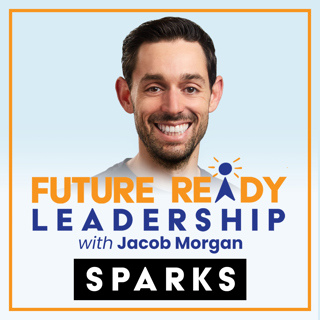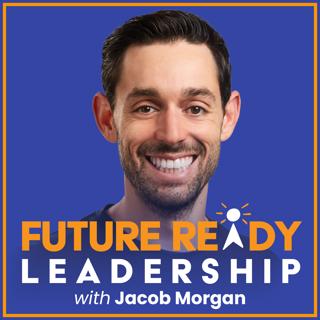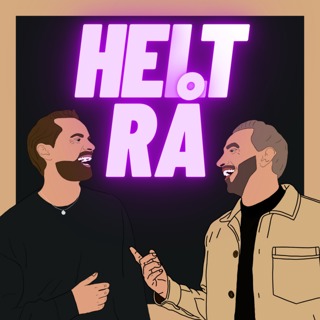
Sparks: Be a Better Leader: Five Trends You Need to Embrace to Become Future Ready
The world of work is changing faster than ever! Globalization, mobility, millennials, technology, and new behaviors are transforming how we lead. In today's Leadership Spark episode, I break down these five trends reshaping work and reveal why they’re forcing every manager to become a better leader. I explore how these shifts are making traditional management obsolete, why people no longer need to work for your company, and what it takes to create an environment where they want to. Get ready to rethink your leadership approach to attract and inspire top talent in today’s competitive job market. This is an episode you can’t miss. ________________ Start your day with the world’s top leaders by joining thousands of others at Great Leadership on Substack. Just enter your email: https://greatleadership.substack.com/
25 Jul 8min

The Right Way to Handle Tough Conversations Without Losing Your Team
Most leaders avoid tough conversations out of fear—of seeming harsh, being misunderstood, or facing backlash. But the conversations we dodge are often the key to growth, accountability, and psychological safety. In this episode, Paul Falcone, bestselling author & former CHRO of Nickelodeon Animation, breaks down how leaders can approach tough conversations with clarity, confidence, and compassion. Paul introduces powerful frameworks like the “Performance vs. Conduct” model and the “iron hand with a velvet glove” approach to help leaders hold people accountable without alienating them. He explains why career development and respect in the workplace go hand in hand—and how to deliver feedback that actually builds trust instead of breaking it. We also discuss the delicate balance between psychological safety and high standards, the risks of having too much sensitivity in today’s workplace, and how values-based leadership is quickly becoming a CEO-level priority. Paul shares real-world strategies like quarterly development check-ins, “safe word” communication systems, and team-led accountability sessions to help leaders build stronger relationships while reinforcing high performance and conduct. ________________ Start your day with the world’s top leaders by joining thousands of others at Great Leadership on Substack. Just enter your email: https://greatleadership.substack.com/
21 Jul 58min

Sparks: Five Trends Reshaping the Future of Work: Why Challenging Convention is the New Normal
What can a world chess champion teach us about the future of work? More than you think. Just like Magnus Carlsen challenged convention to become the greatest player in history, leaders today need to rethink everything about how we work, lead, and build organizations. This episode explores why challenging convention is no longer optional. We unpack the five trends reshaping work—new employee behaviors, exponential technology growth, a millennial-majority workforce, mobility, and globalization—and why clinging to outdated assumptions is a losing strategy. From redefining what it means to be a manager or employee to understanding the Josh’s of the world who thrive without traditional paths, we learn that the future belongs to leaders who aren’t afraid to question norms, rethink structure, and design organizations people actually want to be part of. ________________ Start your day with the world’s top leaders by joining thousands of others at Great Leadership on Substack. Just enter your email: https://greatleadership.substack.com/
18 Jul 12min

How to Use The Six Sources of Influence to Create Behavior Change That Lasts
Great ideas often die, not because they’re wrong, but because no one knows how to influence others to act on them. In leading today’s complex organizations, it’s not enough to be right. The real challenge for leaders is getting people to change behavior, and stay changed. In this episode, we sit down with Joseph Grenny, co-author of Crucial Conversations and one of the world’s leading experts on influence and behavior change, to unpack the science and strategy behind lasting behavior change using his powerful Six Sources of Influence framework. We explore the difference between persuasion and true influence, why most change efforts fail, and how even well-intentioned leaders often rely on the wrong tools—like incentives or policies—when they should be focusing on motivation, social systems, and structural design. Joseph shares real-world stories, including how The Other Side Academy transformed the lives of former felons without a single failed drug test in over a decade. We also look at corporate examples, such as how to pitch ideas internally, how to harness peer pressure the right way, diagnose resistance to change, and why influence always begins with empathy, not authority. ________________ Start your day with the world’s top leaders by joining thousands of others at Great Leadership on Substack. Just enter your email: https://greatleadership.substack.com/
14 Jul 55min

Sparks: How Recognition Shows Your Real Culture Beyond Engagement Scores
Most leaders manage culture with dashboards that measure what's easy, not what's true. In this episode of Leadership Spark, KeyAnna Schmiedl, Chief Human Experience Officer at Workhuman, challenges leaders to stop relying on outdated engagement scores and start looking at what really drives culture: recognition. She explains why traditional HR data misses the lived employee experience and how recognition moments reveal the hidden influencers, team dynamics, and unspoken values shaping your organization every day. KeyAnna unpacks how recognition isn’t just a feel-good perk, but a source of human intelligence that shows who’s thriving, who’s struggling, and where your culture is strongest or weakest. Learn how to stop leading with rear-view metrics and start using recognition data to shape your culture in real time. ________________ This episode is sponsored by Workhuman: AI without purpose doesn’t serve people. It’s why many companies have tried, and few have succeeded. Workhuman is one of them. With the groundbreaking release of Human Intelligence, Workhuman combines AI with real recognition data to help leaders do right by their people, and their organization. It’s how you spot burnout before it leads to turnover. Or discover hidden strengths before they’re overlooked. It’s how you build a culture that’s not only productive—but sustainable. That’s what future-ready leadership looks like. Learn more at Workhuman.com and see how Human Intelligence is helping the most forward-thinking companies lead with insight, empathy, and impact. ________________ Start your day with the world’s top leaders by joining thousands of others at Great Leadership on Substack. Just enter your email: https://greatleadership.substack.com/
11 Jul 9min

What Every Leader Needs to Know About AI, CEO Readiness, and Getting Hybrid Work Right
The future of work is changing, and we can't afford to have our leaders evolve backward by sticking to outdated leadership styles. It's high time for a major upgrade because this new era of work won't wait for you to catch up. In this three-part episode, we explore what it takes to thrive at the highest levels of leadership across three urgent dimensions: executive readiness, AI fluency, and hybrid work strategy. We begin with Mark Thompson, world’s #1 CEO coach and author of CEO Ready, who shares what it really takes to step into the top seat: mastering leadership languages, building trust with your boss, and aligning ambition with the real demands of executive life. Then we dive into the age of AI with Dr. Michael Chui, Senior Fellow at McKinsey and QuantumBlack AI, who explains how agentic AI is reshaping leadership itself—from decision-making and team structure to the rising need for leaders who can manage machines as skillfully as people. Finally, we turn to the workplace of the future with Stanford Professor Dr. Nicholas Bloom, the world’s top expert on remote work, who debunks common myths, lays out why hybrid work is the sweet spot, and reveals how AI might accelerate the decline of fully remote roles. ________________ Start your day with the world’s top leaders by joining thousands of others at Great Leadership on Substack. Just enter your email: https://greatleadership.substack.com/
7 Jul 46min

Sparks: Five Trends Shaping the Future of Work and How Organizations Should Prepare for Them
The real game of the future of work is how to unstuck yourself from the past. As the workplace keeps changing, new expectations are reshaping what it means to work, manage, and lead. But instead of preparing, many organizations are just reacting to challenges, caught off guard by the shifts they should've seen coming. So what’s behind this disruption? In today's Leadership Spark, we break down the five trends driving the future of work: new behaviors, technology, the rise of millennials, mobility, and globalization. These fundamental shifts are already changing how we attract talent, design jobs, and build cultures. If you're still leading with a 20th-century playbook in a 21st-century world, it’s time to upgrade. Explore the trends, the real stories behind them, and what you need to do right now to stay ahead in this episode. ________________ This episode is sponsored by Workhuman: AI without purpose doesn’t serve people. It’s why many companies have tried, and few have succeeded. Workhuman is one of them. With the groundbreaking release of Human Intelligence, Workhuman combines AI with real recognition data to help leaders do right by their people, and their organization. It’s how you spot burnout before it leads to turnover. Or discover hidden strengths before they’re overlooked. It’s how you build a culture that’s not only productive—but sustainable. That’s what future-ready leadership looks like. Learn more at Workhuman.com and see how Human Intelligence is helping the most forward-thinking companies lead with insight, empathy, and impact. ________________ Start your day with the world’s top leaders by joining thousands of others at Great Leadership on Substack. Just enter your email: https://greatleadership.substack.com/
4 Jul 9min

The Shocking Truth Behind Empty Shelves and a Broken Global Trade System
We’ve built a world where products appear with a click and groceries restock like clockwork...until they don’t. When the pandemic hit, it wasn’t just shelves that went empty, it was our illusions of a stable, efficient global supply chain that collapsed. And it wasn’t a freak accident, it was decades in the making. In this episode, we sit down with Peter Goodman, Global Economic Correspondent for The New York Times and bestselling author of How the World Ran Out of Everything: Inside the Global Supply Chain. Peter brings a deep, behind-the-scenes look at how global trade works, and what happens when it doesn’t. We unpack the hidden risks and questionable logic behind decades of offshoring, our blind devotion to just-in-time inventory, and a relentless pursuit of shareholder maximization at the expense of resilience. Peter covers the untold story behind what went wrong during the pandemic and why it could happen again, why we became too dependent on China, and how consulting firms and shareholder obsession made things worse. We also dive into how AI could help (or hurt) global logistics, why nationalistic trade policies could hurt your business more than you think, and what the future of trade and sourcing looks like in a more unstable world. ________________ This episode is sponsored by Workhuman: AI without purpose doesn’t serve people. It’s why many companies have tried, and few have succeeded. Workhuman is one of them. With the groundbreaking release of Human Intelligence, Workhuman combines AI with real recognition data to help leaders do right by their people, and their organization. It’s how you spot burnout before it leads to turnover. Or discover hidden strengths before they’re overlooked. It’s how you build a culture that’s not only productive—but sustainable. That’s what future-ready leadership looks like. Learn more at Workhuman.com and see how Human Intelligence is helping the most forward-thinking companies lead with insight, empathy, and impact. ________________ Start your day with the world’s top leaders by joining thousands of others at Great Leadership on Substack. Just enter your email: https://greatleadership.substack.com/
30 Jun 59min






















